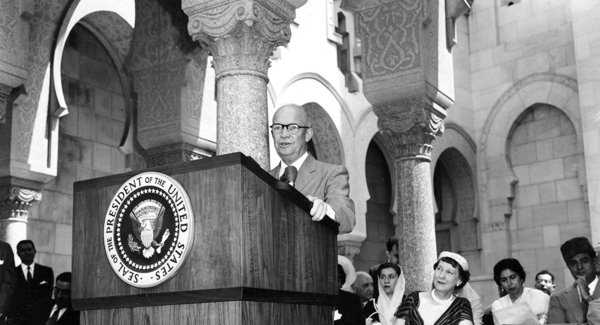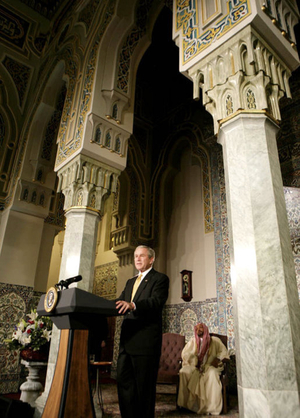When Dwight D. Eisenhower dedicated the Islamic Center in Washington, D.C., in June 1957, his 500-word talk effused good will ("Civilization owes to the Islamic world some of its most important tools and achievements") even as the American president embarrassingly bumbled (Muslims in the United States, he declared, have the right to their "own church"). Conspicuously, he included nary a word about policy.
 Along with the diplomatic representatives of 15 Muslim-majority countries, President Dwight D. Eisenhower took part in the dedication ceremony at Washington D.C.'s Islamic Center on June 28, 1957. |
Exactly fifty years later, standing shoeless, George W. Bush rededicated the center last week. His 1,600-word speech also praised medieval Islamic culture ("We come to express our appreciation for a faith that has enriched civilization for centuries"), but he knew a mosque from a church – and he had more on the agenda than flattery.
Most arresting, surely, was his statement that "I have invested the heart of my presidency in helping Muslims fight terrorism, and claim their liberty, and find their own unique paths to prosperity and peace." This cri du coeur signaled how Mr. Bush understands to what extent actions by Muslims will define his legacy.
 Fifty years later, George W. Bush joined in rededicating the Islamic Center. His talk had much more substance than Eisenhower's. |
Of course, how Muslims fare depends in large part on the future course of radical Islam, which in turn depends in some part on its understanding by the American president. Over the years, Mr. Bush has generally shown an increased understanding of this topic. He started with platitudinous, apologetic references to Islam as the "religion of peace," using this phrase as late as 2006. He early on even lectured Muslims on the true nature of their religion, a presumptuous ambition that prompted me in 2001 to dub him "Imam Bush."
As his understanding grew, Mr. Bush spoke of the caliphate, "Islamic extremism" and "Islamofacism." What euphemistically he called the "war on terror" in 2001, by 2006 he referred to with the hard-hitting "war with Islamic fascists." Things were looking up. Perhaps official Washington did understand the threat, after all.
But such analyses roused Muslim opposition and, as he approaches his political twilight, Mr. Bush has retreated to safer ground, reverting last week to decayed tropes that tiptoe around any mention of Islam. Instead, he spoke inelegantly of "the great struggle against extremism that is now playing out across the broader Middle East" and vaguely of "a group of extremists who seek to use religion as a path to power and a means of domination."
Worse, the speech drum-rolled the appointment of a U.S. special envoy to the Organization of the Islamic Conference, directing this envoy to "listen to and learn from" his Muslim counterparts. But the OIC is a Saudi-sponsored organization promoting the Wahhabi agenda under the trappings of a Muslim-only United Nations. As counterterrorism specialist Steven Emerson has noted, Bush's dismal initiative stands in "complete ignorance of the rampant radicalism, pro-terrorist, and anti-American sentiments routinely found in statements by the OIC and its leaders."
 Sitting in the audience at the Islamic Center on June 27, 2007, three senior Bush administration staffers wore makeshift hijabs: Assistant to the President for Homeland Security and Counterterrorism Fran Townsend (far left), NSC Senior Director for European Affairs Judy Ansley (left), and Under Secretary of State for Public Diplomacy and Public Affairs Karen Hughes (right). |
In brief, it feels like "déjà vu all over again." As columnist Diana West puts it, "Nearly six years after September 11 — nearly six years after first visiting the Islamic Center and proclaiming 'Islam is peace' — Mr. Bush has learned nothing." But we now harbor fewer hopes than in 2001 that he still can learn, absorb, and reflect an understanding of the enemy's Islamist nature.
Concluding that he basically has failed to engage this central issue, we instead must look to Mr. Bush's potential successors and look for them to return to his occasional robustness, again taking up those difficult concepts of Islamic extremism, Shariah, and the caliphate. Several Republicans – Rudy Giuliani, Mitt Romney, and (above all) Fred Thompson – are doing just that. Democratic candidates, unfortunately, prefer to remain almost completely silent on this topic.
Almost thirty years after Islamists first attacked Americans, and on the eve of three major attempted terrorist attacks in Great Britain, the president's speech reveals how confused Washington remains.
--------------------------------------------------------------------------------
Oct. 31, 2007 update: Well, Karen Hughes can discard her makeshift hijab, for she today resigned as undersecretary of state for public diplomacy, a job she has been struggling at since September 2005. The self-styled "Mom" from Texas never understood the threat of lawful Islamism and steered the State Department in exactly the wrong direction.
Nov. 19, 2007 update: Fran Townsend can also toss her hijab, having resigned today as the president's top staff adviser on terrorism and homeland security. Like Hughes, she has a too-narrow view of who the enemy is, limiting it to the violent fringe. - those who use "violence to achieve ideological ends."
